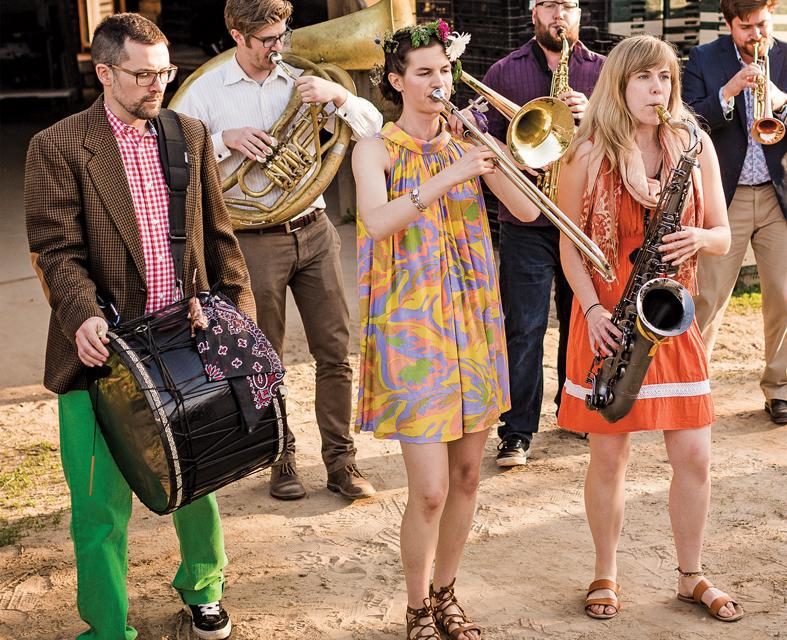Bold, propulsive, and tightly arranged, Rhyta Musik’s brass band music sounds as though it’s been imported directly from the Balkans. It’s a surprise and a credit to the group’s authoritative grasp of its genre that the musicians onstage are not seasoned European performers, but a youthful group mostly in their thirties, only one of whom is of Balkan descent.
The sextet takes a very serious approach to its sound. Founder and percussionist Drew Schmieding has been playing Balkan music on and off for sixteen years and developed a heightened fascination with the genre after attending a “Balkan camp” in Rock Hill, New York, six years ago. That experience led Schmieding to perform with nationally renowned artists like Kosovar accordion player Raif Hyseni and to gather musician friends in Ann Arbor to create his own homegrown Balkan outfit.
Alto saxophonist Eric Schweizer began researching and playing the music in college as a way to maintain his connection to the Croatian traditional songs he heard growing up. Although the rest of the band doesn’t share that blood connection, a Rhyta Musik performance reflects a shared mentality of preserving and promoting Balkan traditions. Trombonist Bethanni Grecynski, who co-leads the band with Schweizer, Schmieding, and snare drummer Xavier Verna, serves as a chipper tour guide while the band is onstage. Speaking through a megaphone slung over her shoulder, Grecynski lends context to many of the traditional tunes the band performs, explaining their country of origin or the stories behind them.
The band’s repertoire is mostly instrumental, but Grecynski also sings on a handful of songs, and she’s an engaging presence onstage, dancing gently as she plays. The rest of the band is dedicated more to musical craft than showmanship. Verna, Schmieding, and Joe Fee make a fine, unconventional rhythm section. The two percussionists both stand with drums slung over their shoulders, Schmieding playing a double-headed Balkan drum called a tupan. Fee lends major oomph to their shuffling rhythms with bass lines played on the helicon, a tuba-like horn.
The most arresting part of the Rhyta sound, however, is the upper-register horn section formed by Grecynski, Schweizer, tenor saxophonist Molly Jones, and trumpeters Ross Huff and Neal Anderson. The five often perform in tight minor-key harmony, but the trumpeters shine in regular solos. Huff, also well known in town for performing with the Macpodz and Jive Colossus, is a standout, executing complex jazz-inspired runs with apparent ease.
The resulting sound is bombastic, sexy, a little dark, and very danceable, as the crowd at any Rhyta show will attest. The band used to count a “lead line dancer” among its lineup, but Rhyta audiences do well enough on their own. Many concertgoers will dance solo, but the band rarely fails to inspire at least some attempt at a group dance. Audience members join hands and either snake through the crowd, shimmying to the beat, or step gently back and forth as they form a circle, echoing the tradition of Balkan folk dance. It’s a cultural tradition not only lovingly researched and represented onstage but also intuitively soaked up by an appreciative audience.
Rhyta Musik performs at “Half-Ass Redux,” part of the U-M Residential College fiftieth anniversary celebration, Oct. 20 (See Events).


